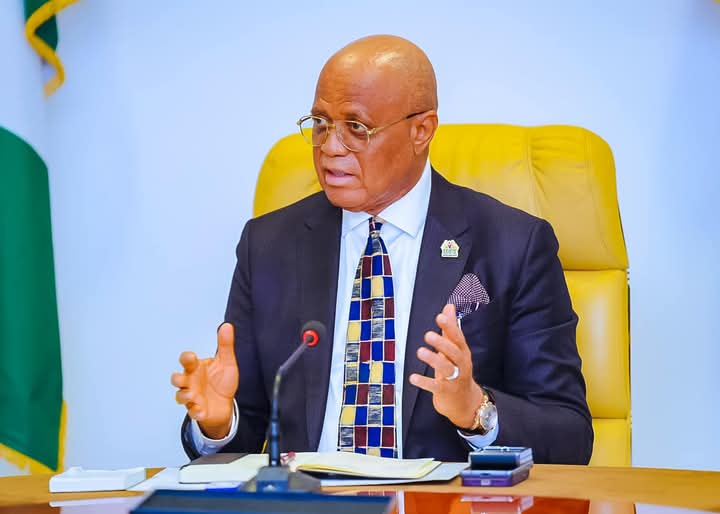Experts and stakeholders in the maritime sector have commended the unwavering commitment of Governor Umo Eno towards the actualisation of the Ibom Deep Seaport and the broader Ibom Industrial City initiative.
Their commendations came over the weekend during a Maritime Trade and Logistics Sensitisation Workshop held at the Dakkada Towers in Uyo. Themed “Harnessing the Economic Potentials of Blue Economy Value Chain in Akwa Ibom State for Productivity and Sustainable Growth,” the workshop drew participation from journalists, engineers, civil society organisations, architects, ICT professionals, and other interest groups.
While declaring the workshop open, the Commissioner for Special Duties and Ibom Deep Seaport, Comrade Ini Ememobong, emphasized the administration’s dedication to preparing Akwa Ibom people to actively engage in the maritime sector.
He stated that with Lagos and Rivers States currently dominating Nigeria’s maritime industry, Akwa Ibom, through the Ibom Deep Seaport and the Ibom Industrial City, is poised to become a major player.
Ememobong highlighted the need for a skilled local workforce ready to seize opportunities that would emerge from the port and associated industries.
According to him, the sensitisation workshop aimed to equip participants with the necessary insights into the maritime and blue economy, allowing them to assess the viability of the sector and find entry points for participation.
He noted that success often occurs when preparation meets opportunity, and since the Eno-led administration is committed to delivering the Ibom Deep Seaport and Industrial City, the people must be prepared to benefit fully from these transformational projects.
Aniefiok Iton, President of Brightflow Conglomerate, speaking on maritime logistics, noted that the maritime sector has vast economic potential, which, if effectively harnessed, could surpass the economic impact of oil exploration. She pointed out that the maritime industry plays a critical role in global trade, facilitating the movement of goods, services, and people across borders.
She added that maximising the blue economy involves exploring avenues such as maritime transport, fisheries, aquaculture, renewable energy, and tourism.
Iton also stressed the need for individuals to gain knowledge of the unique language and operations of the maritime sector, asserting that developing such knowledge is key to unlocking opportunities and achieving economic diversification.
The Rector of the Marine and Oceans Academy, Nigeria, Kingsley Ekwere, underscored the importance of skill acquisition, particularly in water-based operations.
He called for urgent training initiatives, given that the Ibom Deep Seaport is on the verge of becoming a critical hub in West Africa’s maritime landscape.
Similarly, Friday Ufia, a lecturer at the Maritime Academy of Nigeria, explained that maritime trade involved the movement of goods across oceans, while logistics focused on customer service.
He encouraged Akwa Ibom residents to take advantage of training programs at the Maritime Academy to position themselves for roles within the seaport operations.
Director of Projects at the Technical Committee on Ibom Deep Seaport, Akaninyene Ekong, said the maritime industry offers vast opportunities to professionals across disciplines.
He disclosed that proactive steps had been taken at both national and state levels to strengthen the marine and blue economy, noting that a localised marine economy policy is currently being developed under the guidance of the Ministry of Special Duties.
Ekong described the Ibom Deep Seaport and Ibom Industrial City as pivotal anchors for regional economic development, adding that these projects would drive industrialisation and unlock the full potential of agriculture and other local economic assets.
He noted that the planned infrastructure would eventually integrate private estates into the industrial zone.
Godwin Ekong, Acting Director at the Centre for Automotive Training, Transport and Logistics (CATTL), Akwa Ibom State University, highlighted the coastal advantages of the state.
He observed that the state’s extensive coastline, along with its emission and maritime sectors, presents vast investment potential.
He stressed the importance of preparing local entrepreneurs and workers to reduce dependency on external players in the blue economy.
He expressed confidence that Governor Umo Eno’s ARISE Agenda would significantly improve coastal recreation, maritime tourism, aquaculture, infrastructure, transport, and educational management.
Ekong said coastal communities from Oron to Ibaka and Ibeno already engage in small-scale maritime activities, which, with the right investment and training, could evolve into full-fledged economic hubs.
In his goodwill message, the Chairman of the Nigeria Union of Journalists (NUJ) in the state, Comrade Amos Etuk, lauded the workshop as a bold step towards securing Akwa Ibom’s future economic relevance.
He appreciated the inclusion of journalists not just as observers, but as active stakeholders in the Ibom Deep Seaport vision, assuring continued media support in realising the dream.
The vote of thanks was delivered by the Permanent Secretary in the Ministry of Special Duties and Ibom Deep Seaport, Udosen Udoh, represented by the Head of Project Implementation, Coordination and Monitoring, Arc. Ekanwan Alale.
He thanked all participants for embracing the opportunity to learn, relearn, and unlearn.
Other speakers at the workshop equally applauded Governor Umo Eno’s passionate drive and strategic vision for bringing the Ibom Deep Seaport project to fruition, describing it as a transformative initiative that would reshape the economic landscape of Akwa Ibom and the region at large.
















